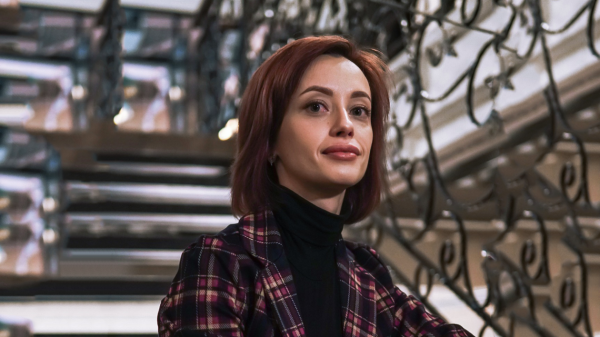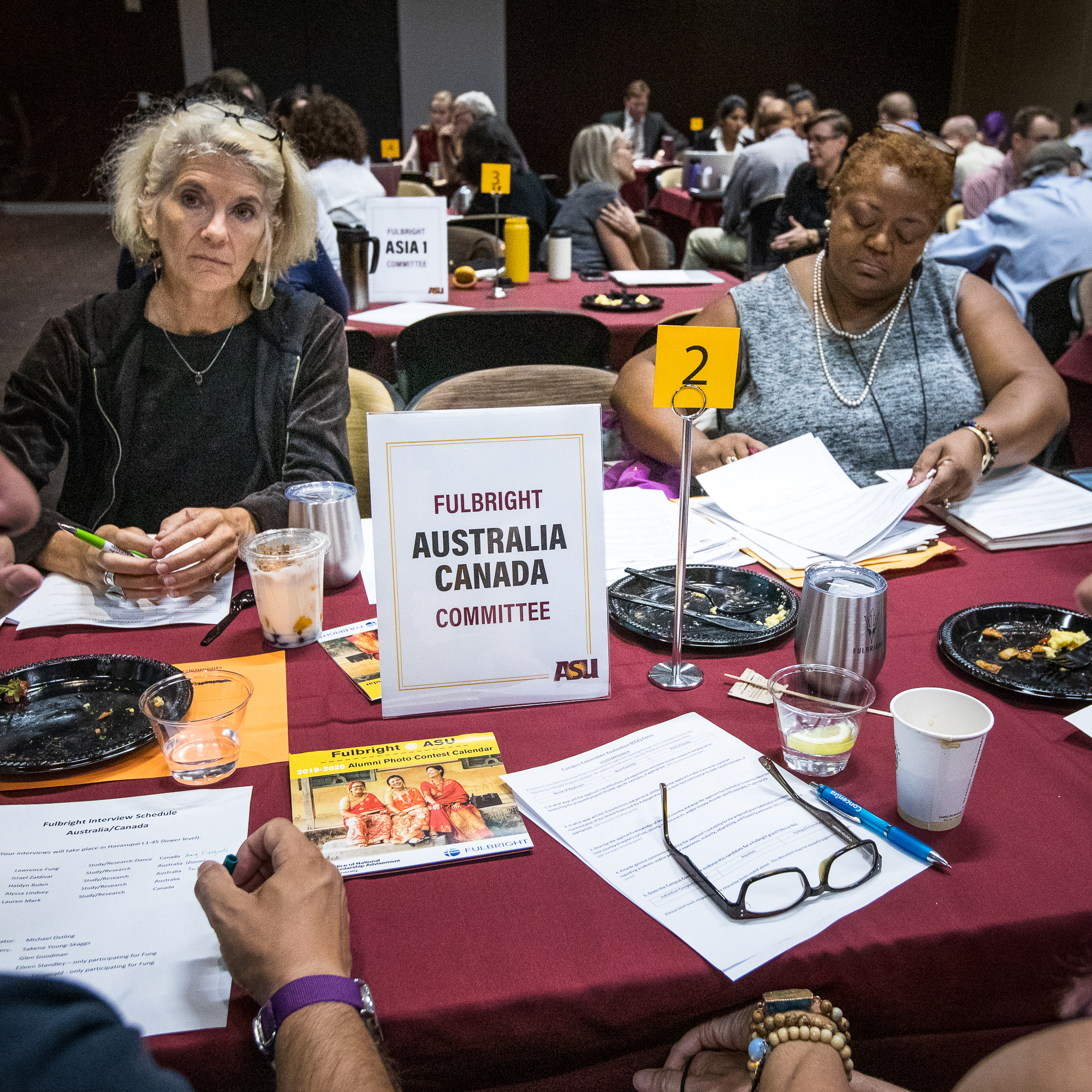Applicants for prestigious awards get support from entire ASU community

Arizona State University has been one of the top producers of students who win the prestigious Fulbright award to travel overseas, and this year, the university has engaged even more people in the campus community to support applicants.
ASU has 21 students in the U.S. government’s flagship international educational exchange program for 2018-19 — more than Harvard, Columbia and Stanford universities. And with 21 Fulbright winners out of 53 applicants, ASU’s selection rate was 39.6% — the highest among top-producing schools.
Now, ASU is trying to increase the number of applicants and, hopefully, award winners, according to Kyle Mox, director of the Lorraine W. Frank Office of National Scholarships Advisement at ASU and associate dean of Barrett, The Honors College.
“Considering the size of ASU, we’d like to see our applicant pool be proportionate to that,” he said. “All of the top 10 performing schools in the U.S. have over 100 applicants each year, and we should be able to get to that.”
Currently, there are 77 applicants in the interview phase of the process this semester.
“We celebrate pressing ‘submit,’” Mox said. “These 77 students have set themselves apart by taking this risk and putting in this time. That’s what we celebrate.”
Writing and reviewing the applications is a lot of work, so ASU has expanded the support community.
“If you consider that the average number of (personal statement) drafts that successful applicants sent to us last year was seven, and if you conservatively say 30 minutes to review each draft plus the time you spend meeting with them plus the time spent on info sessions, it’s 12 hours per applicant and that adds up quickly,” he said.
“We are obligated by the Department of State to interview every single applicant, and we maintain a hands-on, personal approach to that.”
Here are some ways that the scholarship office has marshaled the community to help:
Peer support
The office has increased the number of application workshops, which allows the Fulbright applicants to meet and support each other.
“There are scores of students in these workshops saying, ‘You’re doing the same thing I’ve been doing for the past three months,’” Mox said.
Barrett faculty member Sakena Young-Scaggs (right) and Herberger School of Film, Dance and Theatre Clinical Professor Eileen Standley joined more than 50 of their faculty colleagues in the one-day Fulbright applicant interview process last month at the Memorial Union. Photo by Charlie Leight/ASU Now
“If they don’t understand each other’s applications, they’re not good applications.”
International students
Applicants aren’t expected to be experts in the country they’re applying to, according to Jennifer Brian, senior lecturer and honors faculty fellow in Barrett, The Honors College.
“But we do ask them to do a fair bit of research and to think critically about what their role will be for the brief period of time they’ll be in that country,” she said.
“They’re not going to change the world in one year, but they can be smart about the positive impact they can leave and not just what they can gain for themselves and their future careers.”
One way to inspire applicants is for them to meet international students who are from the country they’re applying to — an idea that the scholarship office expanded this year.
In 2017, Jacquie Lynch, faculty mentor in the scholarship office, started a partnership with the International Students and Scholars Center as her project when she was in the ASU Leadership Academy. She worked with Daniel Hoyle, International Student and Scholar Experience director, to have international students speak at Fulbright predeparture orientations.
“They were able to talk about what the students should expect. The details were vivid and lovely and engaging,” Lynch said.
From there, the idea expanded to have the students engage with peers who are in the application process. This semester, ASU’s international students were invited to meet with applicants and share insights about their home countries, and so far, nearly 150 have done so.
“They’re so generous with their time, and they’re often yearning for that contact,” Lynch said of the international students.
“The review committee wants to know that the students are actively engaging with the host community in ways that are meaningful to them, but sometimes the students might have engagement ideas that aren’t feasible.
“We’ve had feedback that, after talking with the international student, the applicant will have a more nuanced idea of what they can do and what they’re excited to do in that country,” Lynch said.
International Fulbrights
The university has also leveraged the insight of international Fulbright students who are studying at ASU.
Busra Deniz is a master’s degree student from Turkey studying applied linguistics. She’s on the board of the Fulbright International Students Association at ASU and wants to help her peers as they go through the same rigorous process she did.
“Keeping in touch with resident ASU students will foster cultural solidarity as well as provide perspectives from firsthand experience,” she said.
Applicants are interviewed before being approved by ASU for the next phase of the process — interviews with host countries. But it’s also a chance for the students to get feedback on how to improve their applications, and Deniz was happy to provide that.
“I also emphasized that they should explain clearly why they choose that specific host country,” she said.
“That is one of the things that host Fulbright commissions look for. They also look for the answer of why your background makes you the appropriate person for the scholarship.”
Faculty
Professors are key to the Fulbright process, providing letters of recommendation, giving language-proficiency examinations and participating in applicant interviews.
In previous years, the interviews were spread over a few weeks, but this year, Mox tried something new: 77 applicants were interviewed in three hours one day last month by more than 50 faculty members. The scholarship office took over 15 rooms in the Memorial Union for the intensive event.
Brian, who has participated in the interviews for several years, said it’s impressive to see how prepared the students are.
“You can see they have visited the staff for repeated appointments to talk about their personal statements, and the work they’ve done in cultivating good relationships to get really strong letters of recommendation. And you see their thoughtfulness about why they want to go to that particular place and what it means, not necessarily for their career but what it means for them as a person,” she said.
She said the interviews are gratifying because it’s a chance to help the student.
“We ask questions but we get a good 15 or 20 minutes to give them feedback to make their application stronger, and the students are frantically taking notes,” she said. “Everyone is there for a common purpose, and that feels awesome.”
Mox and his team spent the summer creating webinars to help prepare students for the interviews, and they’ll sometimes come in the middle of the night to facilitate a student’s video interview with a faraway host country. They advise students on how to get strong letters of recommendation and how to lay out a research project.
Ideally, students begin working on their applications in the spring of their junior year in order to travel 18 months later, typically in the summer or fall after they graduate. But really, interested students — especially graduate students who want to do research — should start the process much earlier.
“These are not simple applications,” Mox said. “In some cases, you’re proposing a yearlong research project that will take place in a foreign country more than a year from now. That takes planning and thought.”
ASU’s hard work in supporting Fulbright applicants has not gone unnoticed. This past summer, ASU hosted the predeparture orientation for all Fulbrighters nationwide who were going to central Asia, which included embassy representatives.
“I have people ask me all the time, ‘How do you have such great success?’" Mox said. “We work incredibly hard. This is a program that doesn’t matter where you’re from — what matters is how much work you put into it.”
Top image: Kyle Mox, director of the Lorraine W. Frank Office of National Scholarships Advisement at ASU and associate dean of Barrett, The Honors College, talks to more than 50 faculty members who participated in the one-day interview process at the Memorial Union last month. Photo by Charlie Leight/ASU Now
More Local, national and global affairs

Department of State and ASU host Government Leaders Forum to strengthen semiconductor supply chains
By Emilia FrancoAs the global demand for semiconductors accelerates — with projections reaching $1 trillion by 2030 — Arizona State University, in partnership with the U.S. Department of State,…

Environmental writer, ER doctor address violence, climate change, more at sold-out ASU event
“The difficulty of understanding the consequences of heat is amplified by conventional notions of what it means to be hot. In pop culture, hot is sexy, hot is cool, hot is new…” That excerpt was…

Thunderbird at ASU, AUK student appointed as Ukraine’s deputy minister of education and science
Nadiia Kuzmychova, a student in the Master of Leadership and Management (MLM) program at Thunderbird School of Global Management at Arizona State University and the American University…
